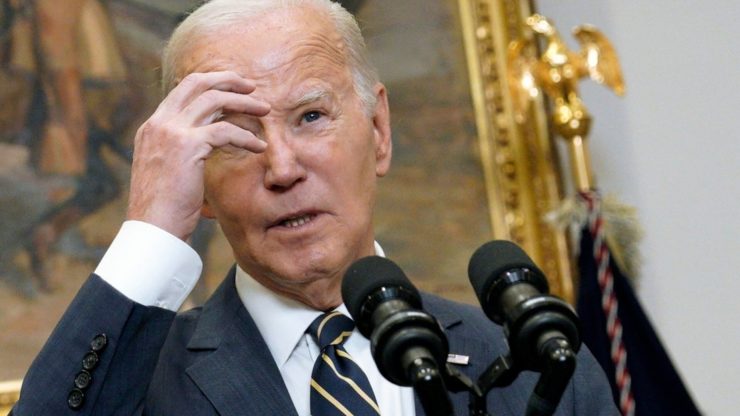
On May 31, US President Joe Biden made a crucial announcement regarding Israel’s acceptance of a “lasting” ceasefire in Gaza. Later that day, Hamas welcomed Biden’s peace plan and his call for “a permanent ceasefire, withdrawal of [Israeli] occupation forces from the Gaza Strip, reconstruction and prisoners exchange”. According to Biden, this was Israel’s plan for a multi-stage end of the war.
The way in which Biden ‘unveiled’ the deal created an impression that backdoor diplomacy may have worked and Israel and Hamas may already have found a common ground. But this was not the case, and peace remains far from achievable. As such, humiliating as it may sound, the Netanyahu government has already rejected what the Western media quickly began to call a historic turning point, with Netanyahu insisting that there will be no permanent ceasefire until Hamas is completely destroyed. Even more humiliating for Biden is the fact that the Netanyahu regime ended up calling the plan a “non-starter”. This has led to Biden’s overall failure in the Middle East.
This failure has its roots in history but became more prominent with the initiation of the so-called Abraham Accords that sought to brush aside the Palestine question and legitimise Israel regionally. The Biden administration did nothing to discontinue this policy. In fact, it accelerated this policy by trying to convince Saudi Arabia to join the accords. However, the fact that the Biden administration is now unable to control Israel means that it is unable to control a country that primarily relies on the US for security. Between 1946 and 2024, Israel received over US$300 billion in military and economic aid from the US. When the latest conflict began on October 7, Washington, in addition to providing the annual US$3.8 billion in military aid, also provided US$8.7 billion from a supplemental appropriations act in April 2024. But Washington now finds itself completely unable to pull the strings to change Israel’s behaviour, which shows how the various recipes of conflict resolution the US has tried in the region in the past 77 years have come to nought.
European Shifts and Isolation of Israel
This has led several EU states – which are otherwise pro-US – to change their policy vis-à-vis the Israel-Palestine question, culminating in the rapid recognition of the State of Palestine and a clear opposition to Israel. This recognition is not only isolating Israel both regionally and globally, but also showing how the West is now internally fragmented vis-à-vis Israel under the US leadership. This process of recognition is expected to accelerate in the wake of Biden’s failure to make Israel stick to the agreed plan.
Netanyahu’s Rejection
Israel’s plain rejection has delivered a deadly blow to Biden, who is just months away from facing a resurgent Trump (despite the latter’s recent conviction). Was it Israel’s intention to humiliate Biden just before the elections to underscore a grand failure of his foreign policy? Given Trump’s close ties with Netanyahu – which also led to the infamous Abraham Accords – the Netanyahu regime might be ditching Biden in favour of Trump to make the latter more relevant in the domestic and international scenario (and extend him the crucial helping hand in the wake of the ongoing legal crisis).
This humiliation is systematic. A few weeks ago, when the Netanyahu regime announced its plan to invade and bomb Rafah, Biden responded by saying that the US would not supply weapons to Israel. Although this announcement was not expected to have a major impact on Israel’s ability to wage the war due to the weapons it had already been supplied, Israel, showing a complete disregard for its main ally, still invaded Rafah, forcing almost a million people to flee for their lives once more.
Domestic and International Implications
These Israeli steps, while apparently aimed to destroy Hamas but actually involve a systematic genocide of the Palestinians, are directly contributing to making Biden unpopular in the US. Almost 59 per cent of the Americans already disprove of Biden. Among Arab Americans, Biden’s popularity has already plummeted to a mere 18 per cent.
At the same time, Netanyahu is also meeting with foreign policy envoys working with Donald Trump. The purpose of this recent meeting was to ‘better assess’ Israel’s domestic political situation, as well as reassuring that Donald Trump, unlike Biden, is still a lot more suitable for Israel than the current administration. The fact that this meeting was reported in the media also shows the intention behind it, i.e., adding fuel to the fire burning Biden’s prospects and his re-election bid. Netanyahu and his far-right allies naturally favour Donal Trump for his pro-Zionist policy. As reports indicate, Trump has already told his sponsors – which include the Zionist lobby working in the US – that he, if elected, will crack down on pro-Palestine protestors and even deport them.
All of this means that the Netanyahu regime – which is unable and unwilling to stop the war to ensure its own political survival – is indirectly intervening in US politics, although US politicians and policymakers have not made such claims yet. This intervention is contributing to the overall failure of the Biden administration in preventing a genocide of the Palestinian people.
But, Biden himself is also to be blamed for the mess he finds himself in today. His declared support for Zionism and his insistence on supporting Israel’s ‘right to self-defence’ at the expense of innocent Palestinian people kept Israel’s war machine well-oiled for this genocide to happen. Now that the genocide is becoming politically costly, Biden’s efforts at changing the scenario are falling on deaf ears in Jerusalem (because it is politically beneficial for the Netanyahu regime). It is creating an overall political scenario, both domestically and internationally, that shows Biden’s utter failure.
Salman Rafi Sheikh, research-analyst of International Relations and Pakistan’s foreign and domestic affairs, exclusively for the online magazine “New Eastern Outlook”